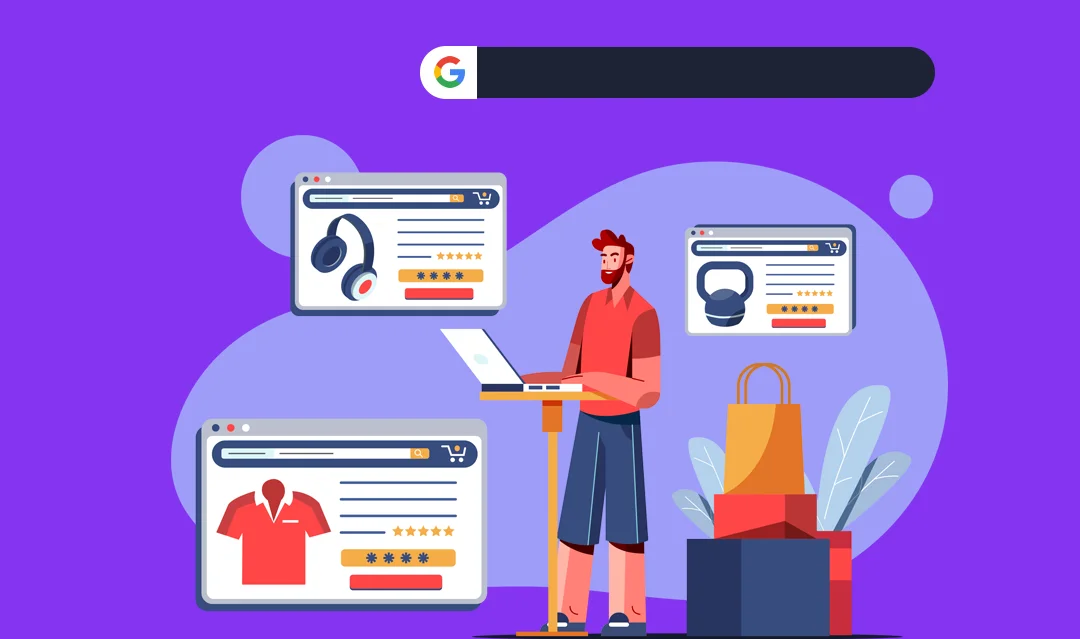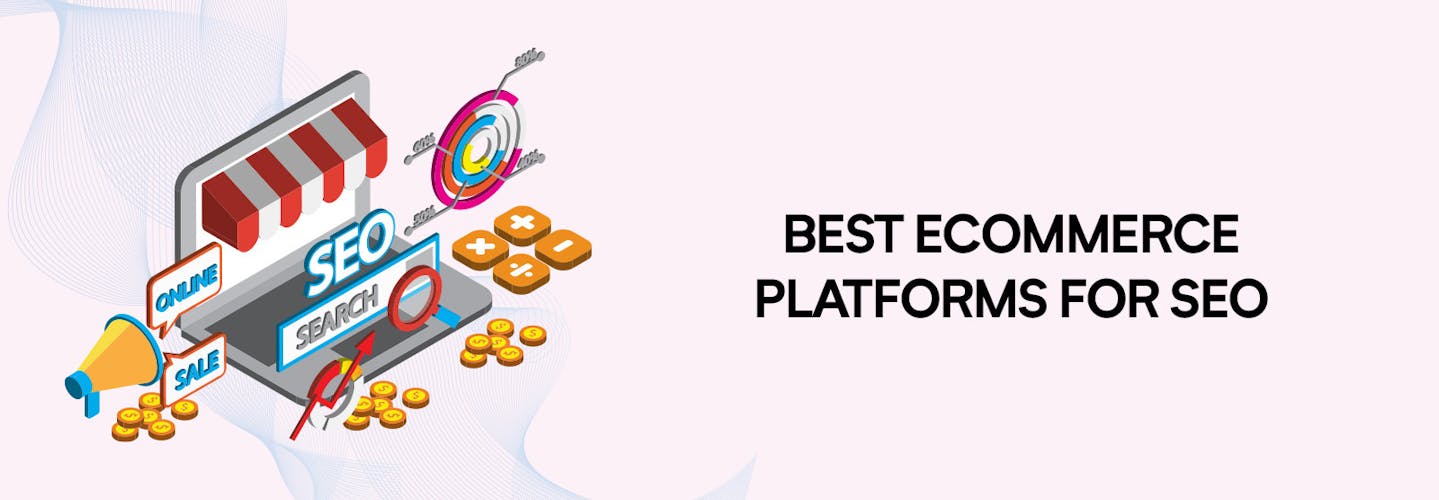
8 Best eCommerce Platforms for SEO To Use In 2025
Are you planning to launch an online store and want to ensure that your business gets the maximum exposure online? Well, then you need to choose an ecommerce platform that is SEO-friendly.
When it comes to ecommerce, SEO plays a crucial role in driving traffic, generating leads, and increasing sales.
Therefore, selecting an ecommerce platform that is optimized for search engines is vital to ensure that your online store ranks high in search engine results pages (SERPs).
In this article, we will discuss the best ecommerce platforms for SEO and why they are suitable for your online store. Let’s dive in it!
What is an SEO-friendly Ecommerce Platform?
An SEO-friendly ecommerce platform is a software solution that allows business owners to create an online store that is optimized for search engines.
These platforms come with features and tools that help you optimize your website for SEO, such as:
- Customizable URLs
- Meta descriptions and tags
- Image optimization
- Mobile-friendly design
- Sitemap generation
- Fast page loading speed
- SSL certificate
- Social media integration
- User-friendly interface
- Blogging platform
Why is SEO important for Ecommerce?
SEO is crucial for ecommerce because it can drive organic traffic to your online store, generate leads, and increase sales.
Here are some reasons why SEO is essential for your ecommerce business:
1. Higher ranking in SERPs:
If your online store ranks higher in search engine results, more people will find your website, and you’ll get more traffic.
2. Increased CTR:
A higher ranking in SERPs also leads to an increase in click-through rate (CTR), which means more people will click on your website’s link.
3. Improved user experience:
When you optimize your website for SEO, it also improves the user experience, leading to more engagement and higher conversion rates.
4. Cost-effective marketing:
SEO is a cost-effective marketing strategy compared to other forms of digital marketing.
5. Enhancing brand credibility:
Ranking higher in search results gives your store more credibility and enhances the perception of your brand among users.
6. Improving user experience:
SEO optimization isn’t solely about ranking higher; it also involves refining the overall user experience, making it easy for users to navigate and find relevant content within your site.
8 Best SEO-Friendly Ecommerce Platforms
When searching for the best SEO eCommerce platforms, it’s essential to look for platforms that come equipped with features and tools that allow for easy optimization of your online store. Some of the top contenders in this category include:
1. Aasaan:
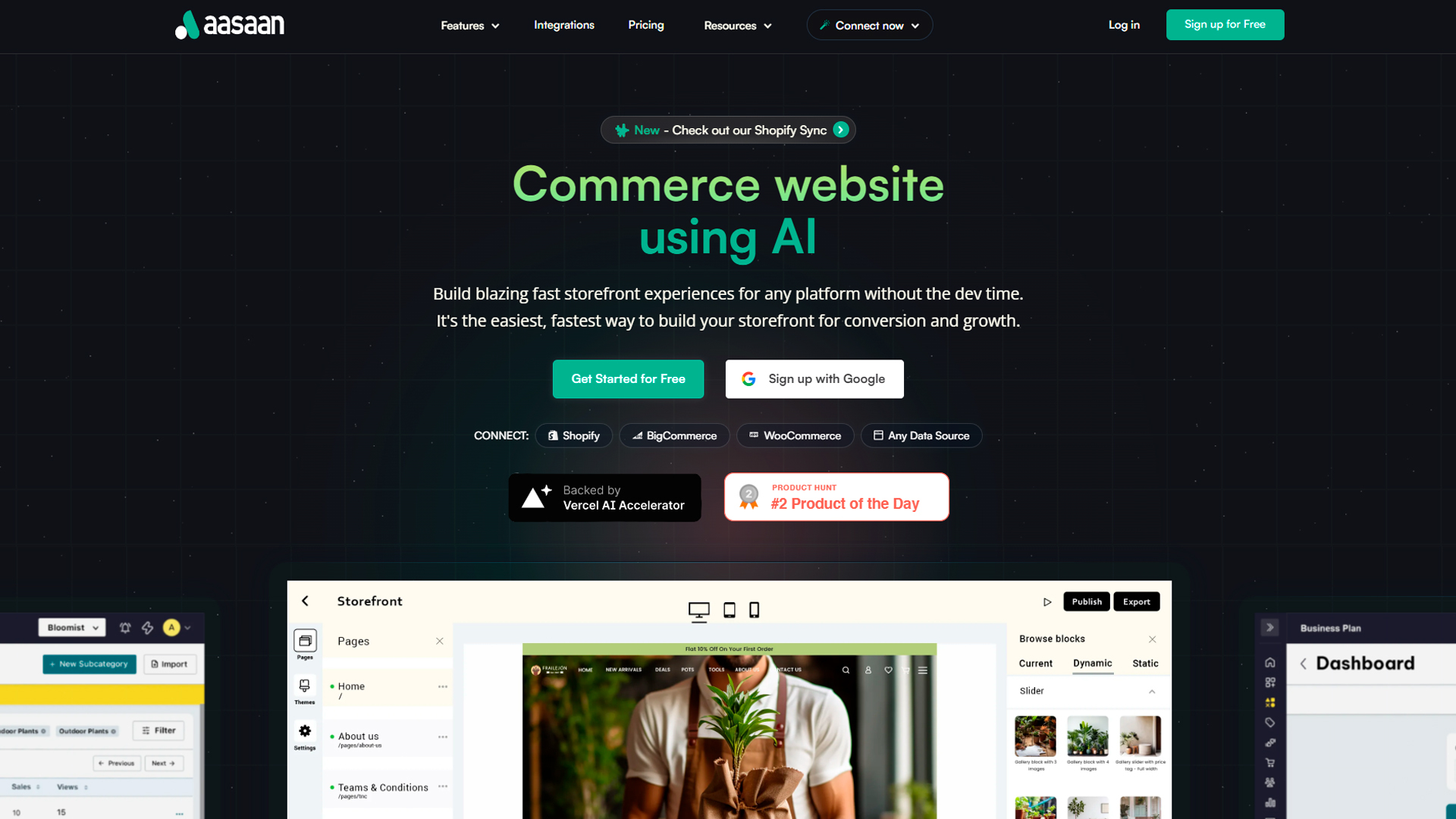
Aasaan is the ultimate website builder that gives you total control over your web pages. You can easily and quickly customize every detail, from blocks and layouts to your brand’s style guide.
You don’t have to worry about breaking anything, as Aasaan keeps all the links and integrations between different software systems working perfectly.
You can also enhance your homepage, blog page, payment page, checkout page and more with our simple and powerful tools. Plus, your customers will love our fast and smooth checkout process.
And you can boost your site’s functionality with various apps for payments, shipping analytics, customer support and more.
Finally, you can manage your orders and analytics with one app and get the insights you need to grow your ecommerce business.
With aasaan you can create user-friendly website , and that allows for custom URLs, automatic sitemap generation, and specific SEO settings at the product/category level or Page level.
Don’t miss this opportunity to take your ecommerce to the next level with Aasaan.
- Clean and well-structured site code conducive to good search engine ranking.
- Offers greater control of your online store’s SEO.
- Allows easy editing of content, page layouts, and domain settings.
- Fully customizable and scalable for businesses of all sizes
- Robust analytics help measure and optimize site performance.
Pricing:
- Premium: $75 per month billed monthly, or $50 billed yearly
- Business plan: $199 per month billed monthly, or $165 billed yearly.
- Enterprise: contact sales.
2. Shopify:

A popular choice among small businesses and startups, Shopify offers excellent SEO features that include built-in tools for on-page optimization, meta tag editing, and image optimization.
- Widely recognized for its ease of use and versatile themes.
- Supports a comprehensive range of SEO apps, plugins, and tools.
- Allows customizations that make SEO optimization effortless.
- Provides well-optimized URLs and website structures.
Pricing: The platform has three plans Basic, Shopify, and Advanced. You will need to pay $29, $79, and $299 per month accordingly.
3.WooCommerce:
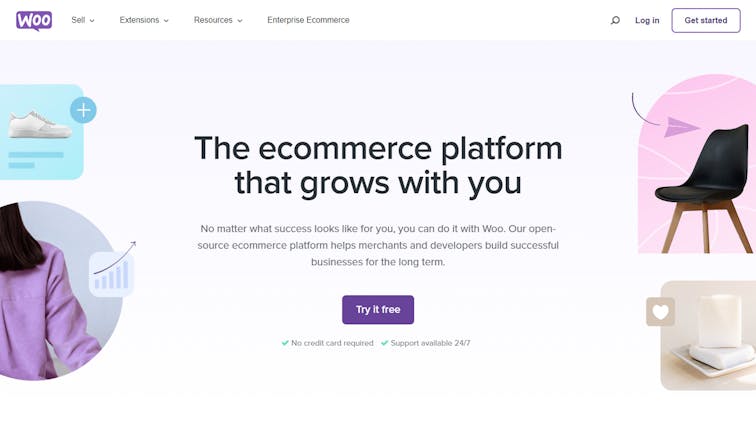
Built on the WordPress framework, WooCommerce is an open-source platform that is highly customizable and offers a wide range of SEO plugins and tools to enhance your ecommerce store’s visibility.
- WordPress-based platform making it user-friendly for those familiar with WordPress.
- Extensive range of SEO plugins available for varied purposes.
- Strong content management capabilities ideal for content-rich websites.
- Clean and well-structured site code conducive to good search engine ranking.
Pricing: The platform is free but with the possibility of upgrading to a Premium plan. The hosting price begins at $6.95/month and the price for a domain name is $15/year.
4. BigCommerce:
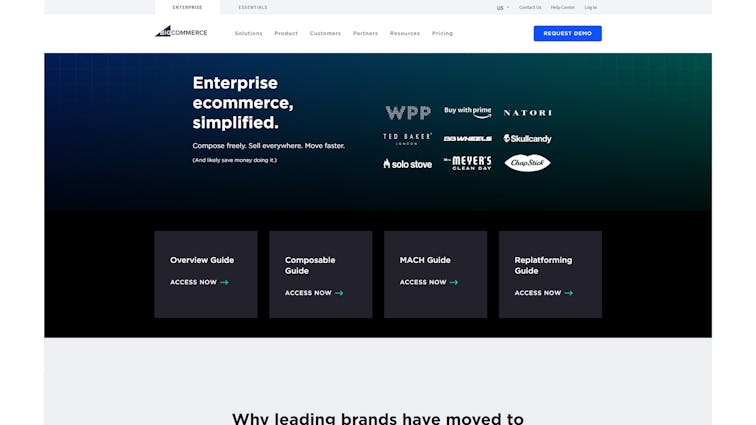
Known for its scalability and user-friendly design, BigCommerce is another SEO-friendly platform that allows for custom URLs, automatic sitemap generation, and specific SEO settings at the product/category level.
- Known for its built-in advanced SEO and marketing features.
- Effortlessly handles tasks such as creating sitemaps, meta tags, and tiered categories.
- Integrates seamlessly with popular email marketing tools like Mailchimp.
- Offers high availability and flexibility for your online store.
Pricing: There are numerous options available at the platform including Enterprise plans. Here are three of their most popular plans: Standard ($29.95/month), Plus ($79.95/month), and Pro ($299.95/month).
5. Magento:
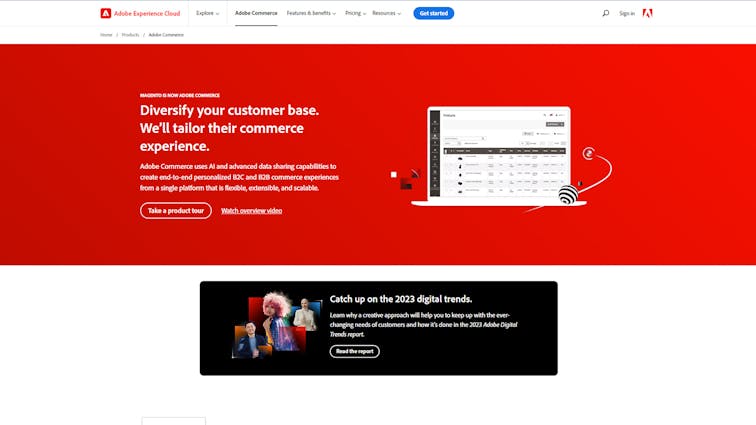
This comprehensive ecommerce platform offers countless SEO tools and extensions, allowing for complete control over on-page and off-page optimization.
- Fully customizable and scalable for businesses of all sizes.
- Offers greater control of your online store’s SEO.
- Allows easy integrations with popular SEO tools and plugins.
- Large user base and community that continually update SEO best practices.
Pricing: Magento Open Source costs $10,000-$60,000/year, Magento Commerce costs $22,000-$125,000/year based on sales . Magento Commerce Cloud costs $40,000-$190,000/year based on sales
6. Squarespace:

Featuring a user-friendly interface and a template-based design, Squarespace is known for clean HTML markup and easy implementation of essential SEO elements like title tags and meta descriptions.
- Known for stunning and professionally designed templates specifically for online stores.
- Allows easy editing of content, page layouts, and domain settings.
- Integrated SEO tools facilitate improvements for on-page ranking factors.
- Robust analytics help measure and optimize site performance.
Pricing: Four plans to choose from. Personal: $14/month. Business: $23/month. Basic Commerce: $27/month. Advanced Commerce: $49/month.
7. Volusion:

With a rich set of features, Volusion offers an intuitive approach to SEO, taking care of crucial aspects like on-page optimization, technical SEO, redirect management, and XML sitemap generation.
Pricing: Four packages to choose from. Annual plans are cheaper than monthly ones. Personal: $35/month. Professional: $79/month. Business: $299/month. Prime: Based on GMV.
8. 3dcart:
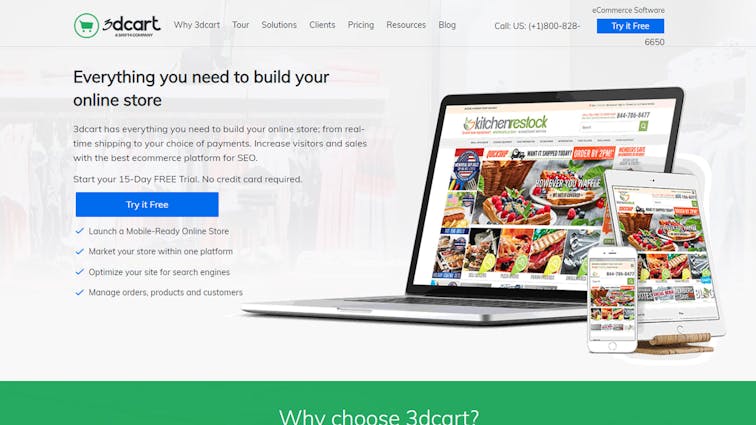
As an SEO-optimized ecommerce platform, 3dcart ensures proper indexing of your products, fast page load speeds, and mobile optimization.
- Designed with SEO in mind, offering powerful features for online merchants.
- Includes tools for creating SEO rich URLs and customizable listings.
- Integrates with Google Shopping and major social media platforms for optimized visibility.
- Offers expert support and comprehensive SEO services.
Pricing: 3dcart has six plans from $19 to $799 per month. The plans differ by the number of users, bandwidth, and storage. All plans have no transaction fees. You can try any plan for free for 15 days.
How to Choose the Top SEO Ecommerce Platform for Your Business?
When it comes to selecting the Best SEO ecommerce platform for your business, you need to consider various factors, such as SEO features, user-friendliness, customization options, pricing, and payment options.
Here are some tips to help you choose the best ecommerce platform for your business:
1. SEO Features:
Make sure to choose an ecommerce platform that offers a range of SEO features, such as customizable URLs, meta descriptions, and tags.
It should also come with a sitemap generator, fast page loading speed, and mobile-friendly design.
2. User-friendliness:
Choose an ecommerce platform that is easy to use and comes with a user-friendly interface.
It should also offer a range of templates and customization options to help you create a visually appealing online store.
3. Customization Options:
Choose an ecommerce platform that offers a range of customization options, such as customizable themes, product pages, and checkout pages.
It should also allow you to integrate third-party apps and plugins to enhance your website’s functionality.
4. Pricing:
Choose an ecommerce platform that offers pricing plans that suit your budget and business needs. It should also come with transparent pricing and no hidden fees.
5. Payment Options:
Choose an ecommerce platform that offers a range of payment options to your customers, such as credit/debit card payments, PayPal, and other digital wallets.
It should also come with secure payment gateways to ensure the safety of your customers’ financial information.
6. Customer Support:
Choose an ecommerce platform that offers reliable customer support to its users.
It should come with various channels of support, such as live chat, email support, and phone support.
7. Scalability:
Choose an ecommerce platform that can scale with your business as it grows.
It should offer a range of features and functionalities that can help you expand your online store and accommodate more customers.
8. Integration:
Choose an ecommerce platform that allows you to integrate with other tools and software, such as accounting software, marketing tools, and analytics tools.
This can help you streamline your business operations and improve your website’s performance.
Enhance Your Ecommerce Store’s SEO with These Features:
By incorporating these specific features into your ecommerce store, you can boost your site’s SEO performance:
1. User-friendly website structure:
Organizing your ecommerce site with a clean architecture makes it easy for both search engines and users to navigate your store.
2. Optimized product descriptions:
Unique, keyword-rich product descriptions improve visibility on search engines while also providing helpful information to potential customers.
3.SEO-friendly URLs:
Create simple, human-readable URLs that contain targeted keywords and provide a clear understanding of a page’s content.
4. Responsive design:
A mobile-responsive design ensures that your store is optimized for all devices, helping to improve both user experience and search rankings.
5. High-quality content:
Regularly publishing valuable, high-quality blog posts and articles on your ecommerce site not only boosts your SEO performance but also increases user engagement and establishes your store as a reliable and informative resource.
6. Social media integration:
Incorporate share buttons and social media links into your ecommerce store to increase exposure, brand recognition, and the possibility of generating organic backlinks.
7. SSL Certificate:
Ensure a secure browsing experience for your users by implementing an SSL certificate, which not only establishes trust but also has a positive impact on your search rankings.
8. Fast loading times:
Optimize your store’s loading speed by compressing images, using efficient server infrastructure, and leveraging browser caching, as search engines reward faster-loading websites.
9.Google Analytics integration:
Track and understand key performance metrics of your ecommerce store with Google Analytics , allowing you to improve your SEO strategy and make data-driven decisions.
SEO Best Practices for Ecommerce Stores:
To enhance your ecommerce store’s SEO performance, follow these best practices :
1, Keyword research
Identify the most relevant and high-traffic keywords for your niche and incorporate them into your website content strategically.
2. Optimize title tags and meta descriptions
Create unique and meaningful title tags and meta descriptions containing targeted keywords for each of your web pages to improve search rankings.
3. Use header tags appropriately
Use header tags (H1, H2, H3) effectively to provide hierarchy and improve content readability for both users and search engines.
4. Improve internal linking
Incorporate internal links within your content to make it easier for users to navigate and discover related content within your website
5. Optimize images and ALT tags
Compress images to reduce loading times and use SEO-friendly ALT tags containing relevant keywords to make it easier for search engines to understand your visual content.
6. Page speed optimization
Improve your website’s loading speeds by using efficient server infrastructure, caching methods, and code compression, as faster websites are more favorable in search rankings.
7. Implement schema markup
Using structured data markup helps search engines better understand your content, and may increase the chances of getting rich snippets displayed in search results.
8. Focus on link building
Acquire high-quality, authoritative backlinks to your ecommerce store by creating share-worthy content, collaborating with influencers, or writing guest articles for well-known blogs in your niche.
9. Monitor SEO performance
Regularly track your store’s SEO performance using tools like Google Analytics, Google Search Console, or specialized SEO tools, and adjust your strategy accordingly.
10. Stay up-to-date with SEO trends
Keep yourself informed about the latest SEO trends and search engine algorithm updates to ensure that your ecommerce store stays relevant and optimized for the best results.
In Conclusion:
Enhancing your ecommerce store’s SEO performance is crucial to its growth and success.
A well-optimized store not only attracts more organic traffic but also increases customer trust, improves user experience, and leads to higher conversion rates.
Following SEO best practices and incorporating vital features into your store can help you outperform your competitors and achieve success in the increasingly competitive online retail space.
FAQ’S:
1. Are ecommerce platforms mobile-friendly and how does this impact SEO?
Most ecommerce platforms are mobile-friendly, and this is important for SEO. Google gives preference to mobile-friendly websites in its search results. Ecommerce platforms should offer responsive design, which ensures that online stores are accessible on mobile devices. This can lead to higher rankings in mobile search results and an improved user experience for mobile users.
2. How important is site speed for SEO on ecommerce platforms?
Site speed is crucial for SEO on ecommerce platforms. Slow-loading pages can result in a poor user experience, which can lead to lower rankings in search results. Ecommerce platforms should offer features that optimize site speed, such as image compression, caching, and minification of CSS and JavaScript.
3. What are the best ecommerce platforms for SEO?
There are several ecommerce platforms that are known for their SEO-friendliness. Some of the best ones include Aasaan, Shopify, WooCommerce, BigCommerce, Magento, and Volusion. These platforms have features and tools that allow users to optimize their online stores for search engines.



